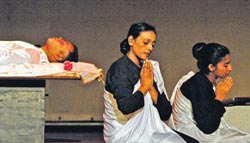
One man’s death tells history of a wounded nationSunethra Bandaranaike is the moving spirit of the Sunera Foundation. At the Bishop's College auditorium, on May 29 she moved in a mysterious way a wonder to perform. Through the Sunera Foundation she presented a play called The Last Two Minutes which and here is the wonder - made the contemplation of Death an exhilaratingly enjoyable experience. Sunethra was clearly the facilitator par excellence of the play. Rohana Deva imaginatively directed it and eerily played the crucial role of Death (or Maara). He had also written the lyrics.
The play had been brilliantly choreographed by Ramani Damayanthi who also alluringly personified a segment of her own choreography. Janaka Fonseka's music was out of this world. It still reverberates in my brain. Let me come right out and admit it: I am dying to experience again the contemplation of Death in The Last Two Minutes. First three minutes When the invitation to see The Last Two Minutes arrived, the first thing that came to my mind was the title of Nobel Prize winning physicist Steven Weinberg's famous book called The First Three Minutes. It is a scientific account of the first three minutes of the history of the Universe which began about 15 billion years ago. A sentence from that book is etched in my memory because of its putative incredible accuracy. It goes like this: "At about one hundredth of a second, the earliest time about which we can speak with any confidence, the temperature of the universe was about a hundred thousand million degrees Centigrade." Message The message of The Last Two Minutes is even less doubtful and perhaps more to the point: “Finally Death is the winner. Death is always the winner". During the past few years in this thrice-blessed land, not a day has passed without gory verification of that verity. Death has indeed been the only winner. The pay The invitation stated that the play would begin at 7.15 p.m., and when we arrived at the venue prominently displayed notices informed us that the doors of the auditorium would be opened only at 7.15 p.m. When the doors were opened precisely at 7.15 p.m. and we began streaming into the auditorium, a funeral scene was already being enacted on the stage. The body of a young man was in the coffin mourned by his family and friends (The dead man turns out to be a Sinhalese soldier who had lost both his legs in action, married to a Tamil woman. He had committed suicide in a fit of depression). People drop in to pay their last respects and the last rites are performed by two Buddhist monks (in Sinhala) and a Tamil Christian priest (in Tamil). There was a manifest parity of status accorded to the two languages. (To be brutally frank, I rued the day in 1956 when a famous Sinhalese leader made Sinhala the only state language of our country in 24 hours, and set in motion the train of events that gives this play its stark contemporary relevance.) Ritual Then appears the ritual from which the play derives its name. The family members of the dead man were asked to leave the room for two minutes, purportedly to enable the dead man to make peace with his life. After they leave the real drama begins. The personification of Death (Maara) arrives on the scene to celebrate his final victory. The dead man sits up in his coffin. Maara mocks him and taunts him and stingingly exults in the fact that he has finally "done him in" (to adapt Liza Dolittle's phrase in Bernard Shaw's Pygmalion). Then there is a series of flashbacks in the life of the dead man virtually from the womb to the tomb. The flashbacks tantamount to a potted history of our troubled country from Independence in 1948 upto Eelam War 4. In the recounting we sense how the Sinhalese and Tamils have been schooled by life to think and grow and develop, and love, and hate, and fight, and suffer, and endure. The incidents are organically linked and integrated with breathtaking artistry and superlative technology such as I have rarely seen on the local stage. In the working out of the plot, aspects of the culture of the country, its truths and myths, and prejudices, and drumbeats, and witchcraft, and dance forms, and varieties of music are brought to the stage for all to see. End of life Finally we are made to realize that gain and loss, fame and disrepute, praise and blame, pleasure and pain which make the world go round are nothing but paths to Death. No one who is born is free from death preached the Compassionate Buddha. In The Last Two Minutes, Sunera Foundation hammered that nail into the coffin of my mind. |
|| Front
Page | News | Editorial | Columns | Sports | Plus | Financial
Times | International | Mirror | TV
Times | Funday
Times || |
| |
Copyright
2007 Wijeya
Newspapers Ltd.Colombo. Sri Lanka. |
